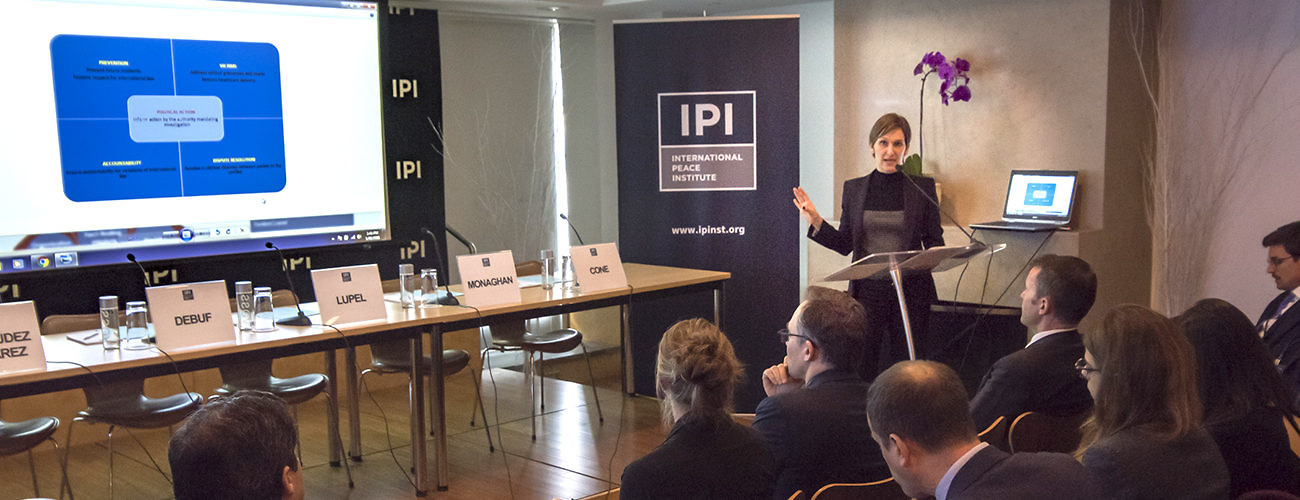An IPI policy forum considered how to operationalize UN Security Council Resolution 2286, which condemned attacks against medical facilities and personnel in conflict situations and called on all parties to adopt practical measures to prevent and end violence against medical care and ensure accountability for violations. The January 16th discussion took place over a year and a half after the adoption of the resolution.
Attacks on healthcare workers and facilities touch “on the very basis of humanity and are at the core of humanitarian law,” Jürg Lauber, Permanent Representative of Switzerland to the UN, said in opening remarks. He lamented that despite the adoption of the resolution in 2016, the rising trend of attacks on healthcare had not been reversed.
He also said that while terrorist groups posed a problem, it is essential to “ensure that counter-terrorism measures do not have adverse effects on the implementation of resolution 2286.”
“Counter-terrorism measures can put limitations on the provision of impartial healthcare in areas where groups labeled as terrorists are present.” he said. To illustrate where access to healthcare in conflict areas had been compromised, he offered the examples of “targeting and arresting healthcare workers, or deliberately denying assistance to the wounded and sick, if they are affiliated with listed armed groups or groups that are labeled as terrorists.”
Els Debuf, Deputy Head of Regional Delegation for Southern Europe, International Committee of the Red Cross (ICRC) and former Head of Humanitarian Affairs at IPI, presented highlights of a report she compiled with Alice Debarre of IPI, noting that 2286 was a landmark resolution and was having a positive effect even if it is hard to see that on the ground. ”We have a strong resolution and a strong framework that is battle-tested and still relevant,” she said.
Dr. Debuf said there were already a large number of mechanisms that could be used to investigate attacks on healthcare, and the report detailed them and their application. “We don’t need new mechanisms, we need to use existing mechanisms more systematically and strategically,” she said.
The report also considers the purpose of conducting investigations, listing prevention, accountability, justice for the victims, and dispute resolution among the motivating factors, and spurring political action as one key outcome.
The report puts forward key recommendations for the international community to implement the resolution, beyond just paying lip-service to an important issue, or “to walk the talk,” as she described it. Most require member state initiative: providing resources to those working on the ground, following up with the necessary political support to be successful, and establishing a platform that makes possible the regular interaction with other stakeholders.
Christine Monaghan, Research Officer, Watchlist on Children and Armed Conflict, said that civil society has “an important role to play in holding groups accountable after attacks.” She argued that “the mere spectre of accountability can serve as a preventative measure.”
Luis Bermúdez Alvarez, Deputy Permanent Representative of Uruguay to the UN—which has just finished two years as a member of the Security Council—said the Council “has a legal and moral responsibility to do everything in its power to avoid the violation of the most basic human rights, including access to healthcare.” He added, “We must be realistic; the attacks will not stop, but we must do a lot more in order to get them reduced.”
Jason Cone, Executive Director, Médecins Sans Frontières/Doctors Without Borders (MSF), said that recent events in Syria, Yemen, Afghanistan, and the Central African Republic remind us of the human toll of those trapped in conflict zones.
He listed three priorities for his organization to function: countering the “criminalization” of healthcare; negotiating the terms of deconfliction, and undertaking independent fact-finding. “We need to be able to identify what happened and how so that groups such as MSF can establish if it is safe to return to work in the area,” he said.
Adam Lupel, IPI Vice President, moderated the conversation.








